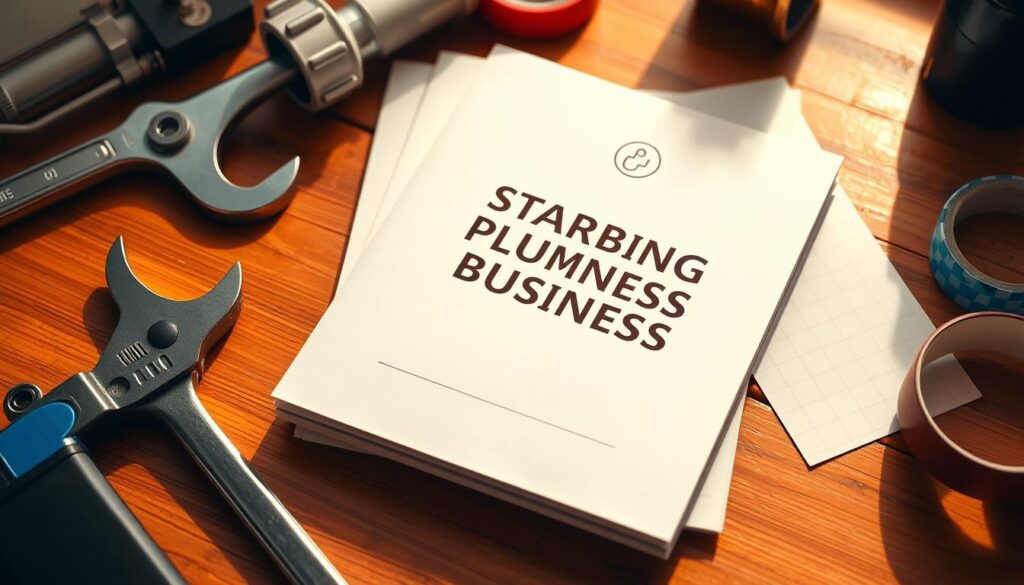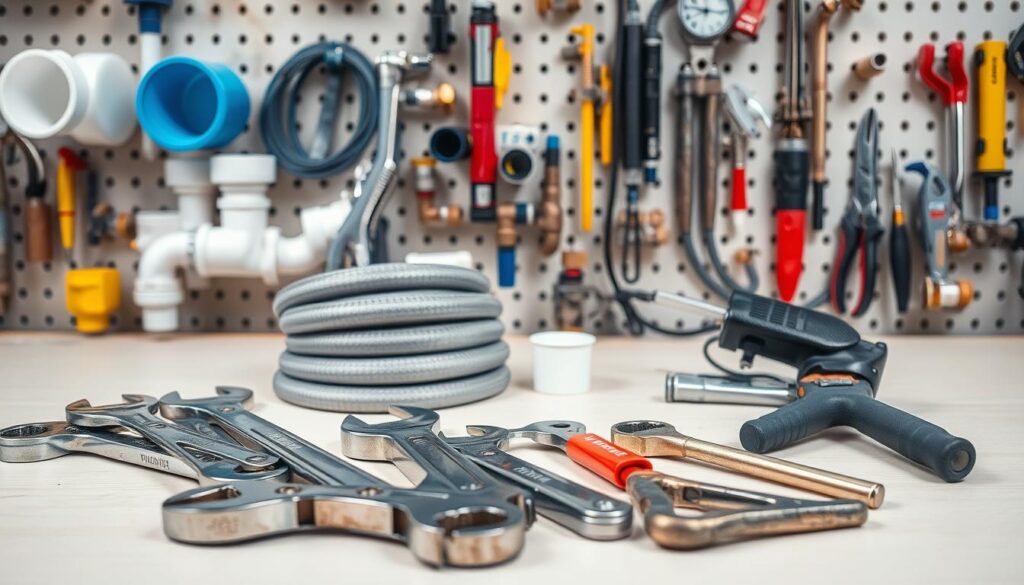Affiliate Disclosure
Plumber Guide Guys is a participant in the Amazon Services LLC Associates Program, an affiliate advertising program designed to provide a means for sites to earn advertising fees by advertising and linking to Amazon.
How to Start a Plumbing Business? Mike Rodriguez stood in his small garage, surrounded by tools and pipes. He dreamed of turning his plumbing skills into a thriving business. He knew starting a plumbing business was more than fixing leaks. It was about building a sustainable business.

The plumbing industry is full of opportunities for ambitious professionals. With a market value of $126.4 billion, starting a plumbing business can be very profitable. Your journey starts with understanding the industry and preparing a strategic plan.
Starting a plumbing business can seem daunting, but with the right guidance, you can succeed. This guide will help you establish a strong and profitable plumbing business.
Key Takeaways
- Plumbing offers a high-potential business opportunity in a $126.4 billion industry
- Technical skills are important, but business planning is equally key
- Understanding startup costs is vital for long-term success
- Proper licensing and certification are mandatory
- Strategic marketing can help make your plumbing business stand out
Table of Contents
Understanding the Plumbing Industry Landscape
The plumbing industry is a booming field for entrepreneurs. It’s valued at $124 billion and expected to grow by 24% in the next few years. This makes it a great opportunity for skilled professionals.
To succeed in plumbing, you need a smart plan. You must know what services are in demand and which niches are profitable. This knowledge will help you stand out in the market.
Market Value and Growth Dynamics
The plumbing industry is growing for several reasons:
- More homes and businesses are being built.
- Old infrastructure needs regular upkeep.
- There’s a big push for saving water and energy.
- New plumbing technologies are emerging.
In-Demand Plumbing Services
Focus on these services to boost your business:
- Residential Repairs – Quick fixes for leaks.
- Commercial Installations – Setting up big plumbing systems.
- Green Plumbing Solutions – Systems that save water and energy.
- Smart Home Plumbing – Integrating plumbing with modern tech.
Industry Challenges and Opportunities
While the plumbing industry is promising, you’ll face some hurdles. There’s a shortage of skilled workers, prices for materials are rising, and the market is competitive. You’ll need to keep learning and be flexible to succeed.
Success in plumbing comes from understanding market needs and delivering exceptional, specialized services.
Stay up-to-date with industry trends and focus on services that are in high demand. This way, you can create a successful plumbing business in this vital sector.
Legal Requirements and Licensing Process
Starting a plumbing business is a big step. You must understand the legal rules and licensing steps. Each state has its own rules to protect people and keep standards high.
To get your plumbing license, you’ll need to do a few important things:
- Get a high school diploma or GED
- Finish a state-approved apprenticeship program
- Get lots of work experience (usually 4-5 years)
- Pass tough state licensing tests
- Do a background check and show you have insurance
Legal needs for a plumbing business vary by place. But most places need certain licenses. You’ll show you know your stuff, can do the job, and are a pro.
“Proper licensing isn’t just a legal requirement – it’s your professional credibility.”
Important things to think about when getting your plumbing license include:
- Know the rules in your state
- Finish the needed education
- Show you’ve worked in the field
- Get ready for technical tests
- Keep up with professional certifications
Remember, the rules for plumbing licenses can change between homes and businesses. Make sure you know the local rules well to start your business right.
Essential Steps for Business Formation
Starting a plumbing business needs careful planning and smart decisions. It’s important to have a solid legal base to protect your business and ensure success. Here are the key steps to form your business.
Choosing Your Business Structure
Picking the right business structure is key for your plumbing company. It affects your insurance, taxes, and personal safety. Look at these main options:
- Sole Proprietorship: Simple with little paperwork
- Limited Liability Company (LLC): Protects your assets
- Corporation: Most protective but complex
Registration and Permits
Getting your plumbing business legally set up is critical. You’ll need to do several important things:
- Register your business name with the state
- Get a federal Employer Identification Number (EIN)
- Get the right local and state permits
- Register for state tax identification
Insurance Requirements
Getting the right insurance is key to protect your plumbing business. You’ll likely need:
- General Liability Insurance
- Professional Liability Coverage
- Workers’ Compensation Insurance
- Commercial Auto Insurance
Protect your business from risks with the right insurance that fits your needs.
By carefully following these steps, you’ll build a strong base for your plumbing business. This ensures you’re legally and financially safe from the start.
How to Start a Plumbing Business with Proper Planning
Creating a solid plumbing business plan is key to turning your dream into reality. Your plan acts as a roadmap, guiding your company’s growth and drawing in investors.
A good plumbing business plan should have several important parts. These parts show your strategic thinking:
- Executive Summary: A brief summary of your business goals
- Company Description: A detailed look at your plumbing services
- Market Analysis: Deep research on local plumbing industry chances
- Financial Projections: Realistic income and cost forecasts
- Marketing Strategies: Plans to draw in and keep customers
When making your plumbing business plan, aim to impress investors and be a useful management tool. Your plan should be flexible to adjust to market changes while keeping a clear direction.
A well-designed business plan is your blueprint for success. It helps you face challenges and grab opportunities in the competitive plumbing industry.
Include sections that show what makes your business special, your competitive edge, and your goals. Break down your goals into specific, measurable steps. This will help you track your progress and make smart decisions as your business expands.
Financial Considerations and Startup Costs
Starting a plumbing business needs careful financial planning and smart investment. Knowing the costs to start a plumbing business is key for entrepreneurs. They aim to launch a successful venture in this competitive field.
The cost to start a plumbing business varies from $10,000 to $50,000. This depends on location, business size, and services offered. Financing a plumbing startup requires a detailed budget and resource plan.
Initial Investment Requirements
Your startup costs will include several main parts:
- Licensing and certification fees
- Essential plumbing tools and equipment
- Vehicle and transportation expenses
- Insurance and bonding
- Marketing and branding initiatives
Funding Options and Resources
Entrepreneurs have many ways to get funding for their plumbing business:
- Small Business Administration (SBA) loans
- Equipment financing programs
- Personal savings
- Angel investors
- Local business development grants
Creating a Financial Forecast
Creating a solid financial forecast is vital for success. Think about your revenue, expenses, and cash flow. Keep track of your initial investments and make a budget for unexpected costs.
Pro tip: Keep a financial safety net of 3-6 months of expenses. This helps during your business’s early days.
Equipment and Tools Investment Strategy

Starting a plumbing business means investing in the right tools and equipment. The cost of starting your business will depend on the quality and variety of tools you choose. Knowing how to build your toolkit well can greatly impact your business’s early success.
When planning your start-up costs, focus on these key tool categories:
- Basic Hand Tools
- Pipe wrenches
- Adjustable wrenches
- Pliers
- Hacksaw
- Specialized Plumbing Equipment
- Pipe threader
- Drain camera
- Leak detection equipment
- Pipe locator
Here are smart ways to manage your equipment investment:
- Purchase quality used equipment from reputable sources
- Lease specialized tools initially
- Upgrade as your business grows
- Focus on essential tools over luxury items
Here’s a budget breakdown for initial equipment costs:
| Equipment Category | Estimated Cost Range |
|---|---|
| Basic Hand Tools | $500 – $1,500 |
| Specialized Plumbing Equipment | $2,000 – $5,000 |
| Safety Equipment | $300 – $800 |
| Vehicle Modifications | $1,000 – $3,000 |
Investing wisely in your tools is key. Quality equipment boosts efficiency, builds trust with customers, and supports your business’s success over time.
Marketing and Building Your Customer Base
Creating effective marketing strategies is key for new plumbers to succeed. Attracting and keeping customers is vital for your business’s growth. The right marketing can help you shine in a crowded market.
Digital Marketing Strategies That Work
Digital marketing is a powerful tool for plumbers to find customers. Create a detailed online marketing plan that includes:
- Search engine optimization (SEO) for local plumbing services
- Google My Business profile optimization
- Targeted social media advertising
- Professional website with clear service descriptions
- Online review management
Traditional Marketing Methods
Traditional marketing is also important for plumbers. Consider these methods:
- Local print advertising in community newspapers
- Networking with local home improvement businesses
- Distributing branded flyers and business cards
- Participating in community events
Building a Strong Online Presence
Your online presence is like a digital storefront. Invest time in creating a professional and engaging online identity that shows your plumbing skills. Make a responsive website, keep up with social media, and share useful content.
Pro Tip: Customer trust is built through transparent communication and demonstrated expertise.
By using these marketing strategies, you’ll attract more customers and build your brand in the local market.
Hiring and Managing Your Plumbing Team

Building a successful plumbing business starts with hiring skilled, reliable plumbers. Your team’s hard work directly affects customer happiness and your business’s growth.
Here are some key strategies for hiring plumbers:
- Make job descriptions clear and detailed
- Offer competitive pay to attract the best
- Start a strong training program for ongoing skill improvement
Entry-level plumbers usually earn about $49,100 a year. Experienced ones can make up to $60,700. Investing in your team’s growth boosts your business’s reputation and performance.
“Your employees are your most valuable asset in the plumbing industry.” – Industry Expert
Modern tech can make managing your team easier. ServiceTitan helps by letting employees create invoices on mobile devices. This makes work more efficient and cuts down on paperwork.
Managing your team’s performance is key. Hold regular reviews, set clear goals, and offer chances for growth. In 2022, 28% of new hires were people returning to work, showing the value of a good work environment.
- Do quarterly performance reviews
- Provide skill-building workshops
- Build a supportive team culture
By focusing on smart hiring and team growth, you’ll create a strong plumbing team. This team will drive your business to success.
Conclusion
Starting a plumbing business is a thrilling chance for those in the trades who want to be their own boss. It takes careful planning, hard work, and a focus on doing things right. Despite the hurdles, plumbers can earn good money if they succeed.
The top plumbing businesses make 10-20 percent profit, but most only make 2-3 percent. This shows how key it is to have a solid business plan, work efficiently, and market well. These steps are vital when starting your plumbing business.
Success in plumbing depends on many things. You need to follow the law, manage money well, keep learning, and serve customers great. Also, know your local market, build a good team, and create a unique brand that stands out.
See every problem as a chance to grow. Keep learning, be flexible, and love solving problems for your customers. With these traits, your plumbing business can grow into a successful, profitable venture that helps your community.
FAQ
How much does it cost to start a plumbing business?
What licenses do I need to start a plumbing business?
What type of insurance do plumbing businesses need?
How profitable is a plumbing business?
How much does it cost to start a plumbing business?
What licenses do I need to start a plumbing business?
What type of insurance do plumbing businesses need?
How profitable is a plumbing business?
FAQ
How much does it cost to start a plumbing business?
Starting a plumbing business can cost between ,000 and ,000. This depends on things like equipment, vehicles, licenses, insurance, and marketing. You’ll need tools, a work vehicle, licenses, insurance, and marketing to get started.
What licenses do I need to start a plumbing business?
You’ll need a state plumbing contractor license. This requires:
– An apprenticeship program (4-5 years)
– Passing a state exam
– Work experience proof
– A business license
– Local and state permits
What type of insurance do plumbing businesses need?
Plumbing businesses need several types of insurance. These include:
– General Liability Insurance
– Commercial Auto Insurance
– Workers’ Compensation Insurance
– Professional Liability Insurance
– Tools and Equipment Insurance
These policies protect against lawsuits, property damage, and financial risks.
How profitable is a plumbing business?
Plumbing businesses can be very profitable. They can make 0,000 to
FAQ
How much does it cost to start a plumbing business?
Starting a plumbing business can cost between $10,000 and $50,000. This depends on things like equipment, vehicles, licenses, insurance, and marketing. You’ll need tools, a work vehicle, licenses, insurance, and marketing to get started.
What licenses do I need to start a plumbing business?
You’ll need a state plumbing contractor license. This requires:
– An apprenticeship program (4-5 years)
– Passing a state exam
– Work experience proof
– A business license
– Local and state permits
What type of insurance do plumbing businesses need?
Plumbing businesses need several types of insurance. These include:
– General Liability Insurance
– Commercial Auto Insurance
– Workers’ Compensation Insurance
– Professional Liability Insurance
– Tools and Equipment Insurance
These policies protect against lawsuits, property damage, and financial risks.
How profitable is a plumbing business?
Plumbing businesses can be very profitable. They can make $500,000 to $1 million a year. Profit margins are 10% to 20%, depending on the business.
What are the most lucrative plumbing services?
The most profitable services include:
– Emergency repairs
– Commercial plumbing contracts
– Water heater installations
– Sewer line replacements
– Drain cleaning
– Leak detection and repair
How long does it take to start a plumbing business?
Starting a plumbing business takes 6-12 months. This includes getting training, licenses, and setting up marketing.
Do I need formal education to start a plumbing business?
Formal education is not required but is helpful. Most plumbers complete vocational training, apprenticeships, or technical school. These provide the needed skills and knowledge.
What marketing strategies work best for new plumbing businesses?
Good marketing includes:
– A professional website
– Local SEO
– Google My Business profile
– Social media marketing
– Networking
– Referral incentives
– Positive customer reviews
How many employees should I start with?
Start with 2-3 employees. This includes the owner, 1-2 plumbers, and optional admin support. You can grow your team as needed.
What financing options are available for plumbing businesses?
Financing options include:
– Small Business Administration (SBA) Loans
– Traditional bank loans
– Equipment financing
– Business line of credit
– Personal savings
– Angel investors
– Equipment leasing
million a year. Profit margins are 10% to 20%, depending on the business.
What are the most lucrative plumbing services?
The most profitable services include:
– Emergency repairs
– Commercial plumbing contracts
– Water heater installations
– Sewer line replacements
– Drain cleaning
– Leak detection and repair
How long does it take to start a plumbing business?
Starting a plumbing business takes 6-12 months. This includes getting training, licenses, and setting up marketing.
Do I need formal education to start a plumbing business?
Formal education is not required but is helpful. Most plumbers complete vocational training, apprenticeships, or technical school. These provide the needed skills and knowledge.
What marketing strategies work best for new plumbing businesses?
Good marketing includes:
– A professional website
– Local SEO
– Google My Business profile
– Social media marketing
– Networking
– Referral incentives
– Positive customer reviews
How many employees should I start with?
Start with 2-3 employees. This includes the owner, 1-2 plumbers, and optional admin support. You can grow your team as needed.
What financing options are available for plumbing businesses?
Financing options include:
– Small Business Administration (SBA) Loans
– Traditional bank loans
– Equipment financing
– Business line of credit
– Personal savings
– Angel investors
– Equipment leasing

